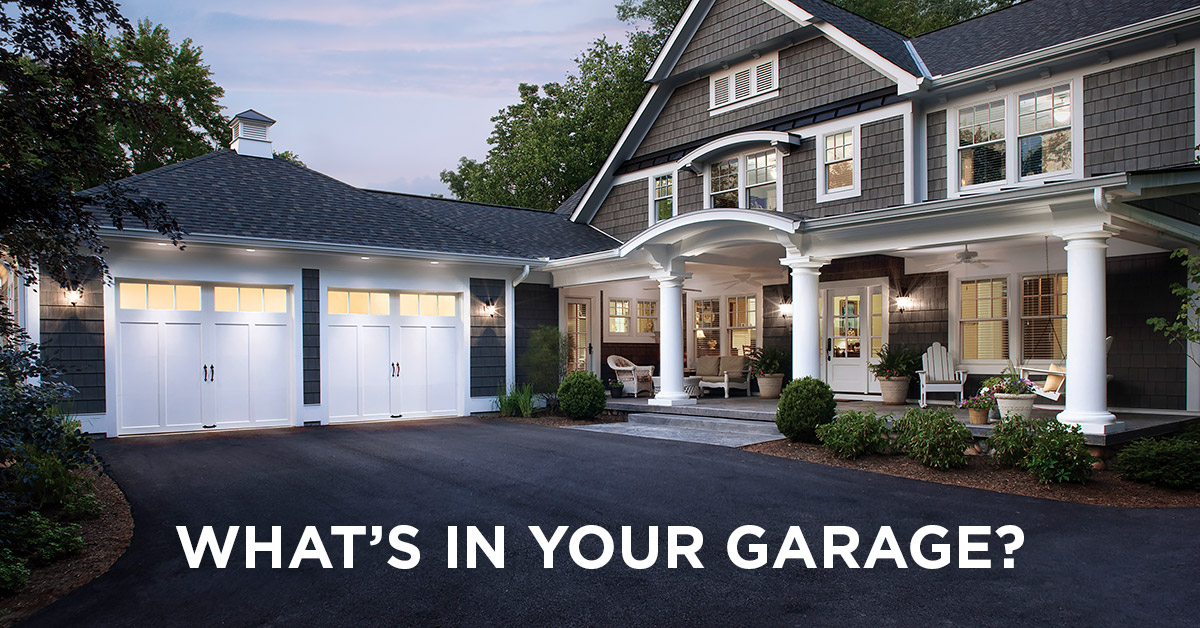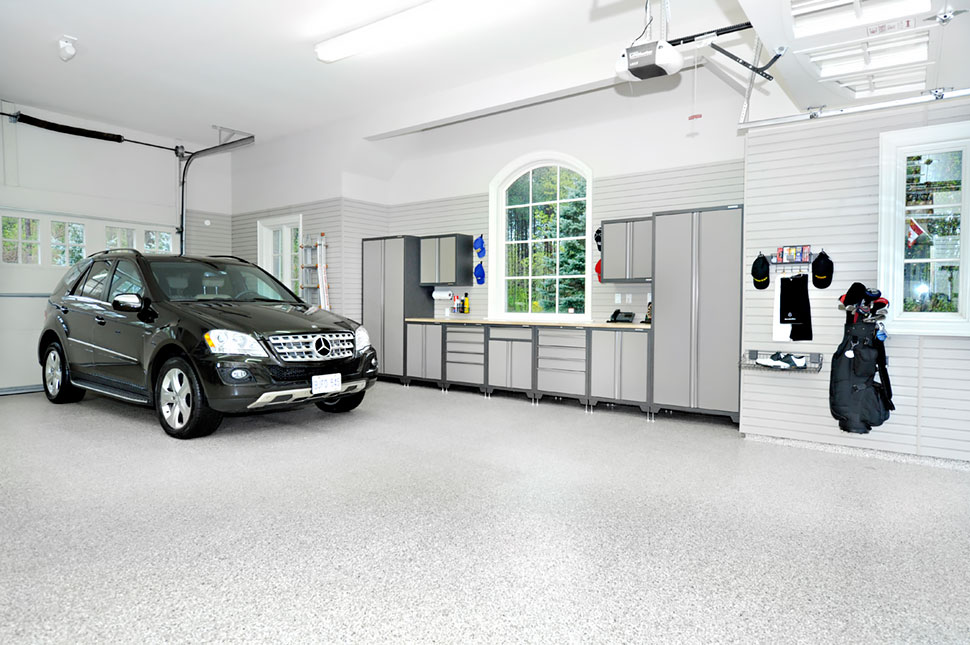A Wall Street Journal survey of homeowners revealed that 74% of them believe parking is the most important function of a garage.
So why do so many homeowners ignore the many benefits of home garage parking?
Garage clutter is the biggest reason that vehicles aren’t being parked indoors. A garage that lacks proper storage systems won’t make the most efficient use of its storage space.
Garage clutter can accumulate quickly and before long it will build up to the point where your vehicles will be relegated to using the outdoors as a storage space.
If you start using your garage for its intended purpose (storing vehicles), you’ll quickly wonder why you waited so long to make garage parking an everyday habit. These seven points illustrate the major benefits of using garage parking.

1. You’ll protect your vehicle investment with garage parking
Parking your vehicles outside when you have a garage simply doesn’t make sense. That’s because a new vehicle is likely the second biggest financial investment you’ll make after a home purchase.
The average cost of a new vehicle in Canada is $38,000 and in the U.S. it’s $35,000.
Protecting your significant investment in your car or truck is just one of many reasons garage parking should be considered essential. You’ll extend the life of your car or truck and get the maximum return on your investment.
2. Garage parking keeps vehicles more secure
It’s a no-brainer that parking your vehicles in a locked garage keeps them more secure. Even with modern auto alarm systems, leaving your car or truck parked in your driveway is an open invitation to a resourceful car thief.
Luxury cars are an obviously desirable targets for thieves. You might be surprised, however, to find that the top ten most-stolen vehicles in America last year doesn’t include any vehicles in the high-end category.
The theft of popular cars like the Honda Accord and Toyota Camry fuels a black market for parts like rims, tires, airbags, and catalytic converters.
Even if your vehicle isn’t stolen outright from your driveway, parking outdoors also makes vehicles a much easier target for vandalism. The contents inside your vehicle are more vulnerable to theft or perhaps you’ll be unlucky enough to have your windows broken or paint job scratched.
However you’re hit by vehicle theft or vandalism, the after-effects won’t be pleasant because:
- you’ll need to deal with the headache of an insurance claim
- it’s deeply unsettling to have one’s property stolen or violated
- you’ll face the temporary inconvenience of not having a vehicle
Some insurance providers might actually take garage parking into consideration when setting your auto insurance premiums. Allstate, for example, recommends it as one of their insurance premium cost-cutting tips.
3. Garage parking protects your vehicles from the elements
Modern cars and trucks may be highly engineered to provide many years of use while withstanding everything Mother Nature can toss their way, but they do have a shelf life.
Even vehicles lucky enough to have dedicated owners who lovingly wash, wax, and rust-proof them like clockwork will begin to show the toll that the elements can take on vehicles.
Rain, snow, and ice will speed up the rusting process. Road salt is also notoriously bad for the bodies of vehicles. Even dew or a light frost on your car or truck will take likely take a cumulative toll over the course of many years.
And homes in warmer climates are also vulnerable to the drawbacks of parking in driveways. Extreme heat makes it very uncomfortable to enter a vehicle that’s been parked in the sun. Scorching temperatures can also cause engine hoses and seals to dry out and crack faster.
Hail, which can cause major damage, is another weather-related consideration. Regardless of where you live, UV exposure also causes vehicle paint jobs and interior colors to fade prematurely.
Acidic bird droppings, damage from tree sap, and exposure to airborne elements like dust, dirt, and pollen will also take their toll on vehicles. The harmful effects of weather-related factors alone should be enough to make garage parking a necessity!
4. It’s more convenient to use home garage parking
Your driveway may be only just beyond your garage doors, but that small amount of distance can be an inconvenience in certain situations.
Garage parking allows you to store your vehicle just a few feet from garage’s interior access door to your home. That can be a huge benefit when you have lots of groceries to bring in. The closer proximity also makes it easier to load items into your vehicle when required.
Even a short walk to a car parked in the driveway when it’s pouring rain can result in a soggy wardrobe if you can’t find an umbrella. That’s why bad weather becomes a non-issue when you need to enter or exit a vehicle that’s parked in a garage.
Homeowners in colder climates will especially appreciate the huge advantage of garage parking when the snow comes. Your covered vehicles won’t need mounds of snow cleaned off them and ice scraped off their windows. They’ll also warm up quicker.
These benefits will save you small amounts of time individually, but add up to many hours that will be collectively saved over the long term.

5. Home garage parking can keep you safer
The convenience that comes with using your home’s garage parking also factors into another one of its benefits – it can keep you safer.
A locked garage that you enter from the interior door of your home provides a safer environment than your driveway when it comes to accessing your vehicle.
And when you arrive home and pull into your garage, anyone looking to do you harm will be more reluctant to take that riskier step of entering your home to do so. They might have fewer reservations if you’re parking in the driveway.
Some garage door openers (like LiftMaster models with MyQ Technology) also let you keep tabs on whether your garage door has been opened while you’re away, for extra peace of mind. Other home security features let you turn on interior and exterior lights shortly before arriving home for added safety.
6. Parking in the garage preserves your curb appeal
Homeowners invest lots of time and money into improving curb appeal by upgrading their home and property’s appearance.
Parking vehicles in your driveway can detract from your home’s curb appeal. In fact, some might even view it as a form of clutter.
Certainly, an empty driveway compared to a driveway with one or more vehicles parked in it projects a cleaner, less cluttered look for a house.
After all, there’s a reason the vast majority of real estate listing photos don’t include parked vehicles in the property’s driveway.
7. Your vehicles are only driven 5% of the time
Most vehicle owners would probably be surprised at how little their vehicles are actually being used.
According to transportation experts, vehicles are typically only being driven 5% of the time. That means vehicles are sitting parked 95% of the time!
For almost any item you own that’s used such a relatively small amount, it would make sense to keep it stored out of sight. A vehicle shouldn’t be any different.
If parking indoors seems like a farfetched reality due to your garage clutter, there are solutions available. Garage Living’s storage racking, slatwall, and cabinetry will help you make room for garage parking in your home once again.
Schedule your free design consultation with us to start taking advantage of the benefits that come with garage parking for your vehicles.
See also: